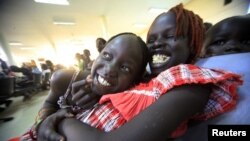JUBA, South Sudan - An airlift is under way to bring more than 12,000 South Sudanese citizens home from neighboring Sudan. The returnees were blocked from going home when Khartoum shut down some of its borders due to clashes with the South. After months of waiting, they are finally arriving in South Sudan.
In April, Sudan declared them foreigners. Without proper paperwork or identification, many were unable to obtain residence permits in Sudan and forced to leave. Working with the South Sudanese government, the International Organization of Migration, IOM, organized an airlift home.
IOM is bringing the returnees to a temporary camp on the outskirts of Juba. Most are coming back after many years spent in the north.
The people at this temporary camp made the long journey from Kosti, where they were stranded for months after Sudanese authorities blocked IOM barges carrying people down the Nile River.
“We stayed too long in Kosti, about one year. There was no transportation and everything became tied to money," explained returnee Jakalin Zakaria. "You have to pay money to put your luggage on the barge. If you don’t have it, they will refuse you. My brother stayed and managed to put my luggage on the barge.”
Many, like Zakaria, are happy to return to South Sudan to restart their lives. South Sudanese often face discrimination in Sudan, especially after the separation of the South last July.
“We have moved from South Sudan to north Sudan 25 years ago. We stayed in northern Sudan. It is better for me to stay here because this is my country and I have to be here instead of staying in northern Sudan,” said Fazia, who is glad to be home.
Moving to a new country has not been easy for the returnees. The IOM has helped, but many people at the camp have had trouble locating everything they brought with them from Sudan.
IOM’s Samantha Donkin says the logistical challenges of transporting more than 12,000 people were massive.
“Kosti itself is about 300 kilometers south of Khartoum," Donkin noted. "So, because the airlift movements are happening same day, it’s a matter of getting all the people onto buses with their hand luggage, travelling to Khartoum, boarding airplanes, then flying to Juba, then organizing their transport from Juba to this transit site, which is about 13 kilometers outside of Juba.”
Some of the returnees will soon be taken back to their hometowns across South Sudan. But IOM says many plan on staying in Juba. IOM expects most of the returnees to remain at the transit site for months.
The camp already has over 7,500 people, and more are on the way. As groups continue to arrive, IOM is working fast to provide new homes for those coming back for the first time in years.
In April, Sudan declared them foreigners. Without proper paperwork or identification, many were unable to obtain residence permits in Sudan and forced to leave. Working with the South Sudanese government, the International Organization of Migration, IOM, organized an airlift home.
IOM is bringing the returnees to a temporary camp on the outskirts of Juba. Most are coming back after many years spent in the north.
The people at this temporary camp made the long journey from Kosti, where they were stranded for months after Sudanese authorities blocked IOM barges carrying people down the Nile River.
“We stayed too long in Kosti, about one year. There was no transportation and everything became tied to money," explained returnee Jakalin Zakaria. "You have to pay money to put your luggage on the barge. If you don’t have it, they will refuse you. My brother stayed and managed to put my luggage on the barge.”
Many, like Zakaria, are happy to return to South Sudan to restart their lives. South Sudanese often face discrimination in Sudan, especially after the separation of the South last July.
“We have moved from South Sudan to north Sudan 25 years ago. We stayed in northern Sudan. It is better for me to stay here because this is my country and I have to be here instead of staying in northern Sudan,” said Fazia, who is glad to be home.
Moving to a new country has not been easy for the returnees. The IOM has helped, but many people at the camp have had trouble locating everything they brought with them from Sudan.
IOM’s Samantha Donkin says the logistical challenges of transporting more than 12,000 people were massive.
“Kosti itself is about 300 kilometers south of Khartoum," Donkin noted. "So, because the airlift movements are happening same day, it’s a matter of getting all the people onto buses with their hand luggage, travelling to Khartoum, boarding airplanes, then flying to Juba, then organizing their transport from Juba to this transit site, which is about 13 kilometers outside of Juba.”
Some of the returnees will soon be taken back to their hometowns across South Sudan. But IOM says many plan on staying in Juba. IOM expects most of the returnees to remain at the transit site for months.
The camp already has over 7,500 people, and more are on the way. As groups continue to arrive, IOM is working fast to provide new homes for those coming back for the first time in years.




